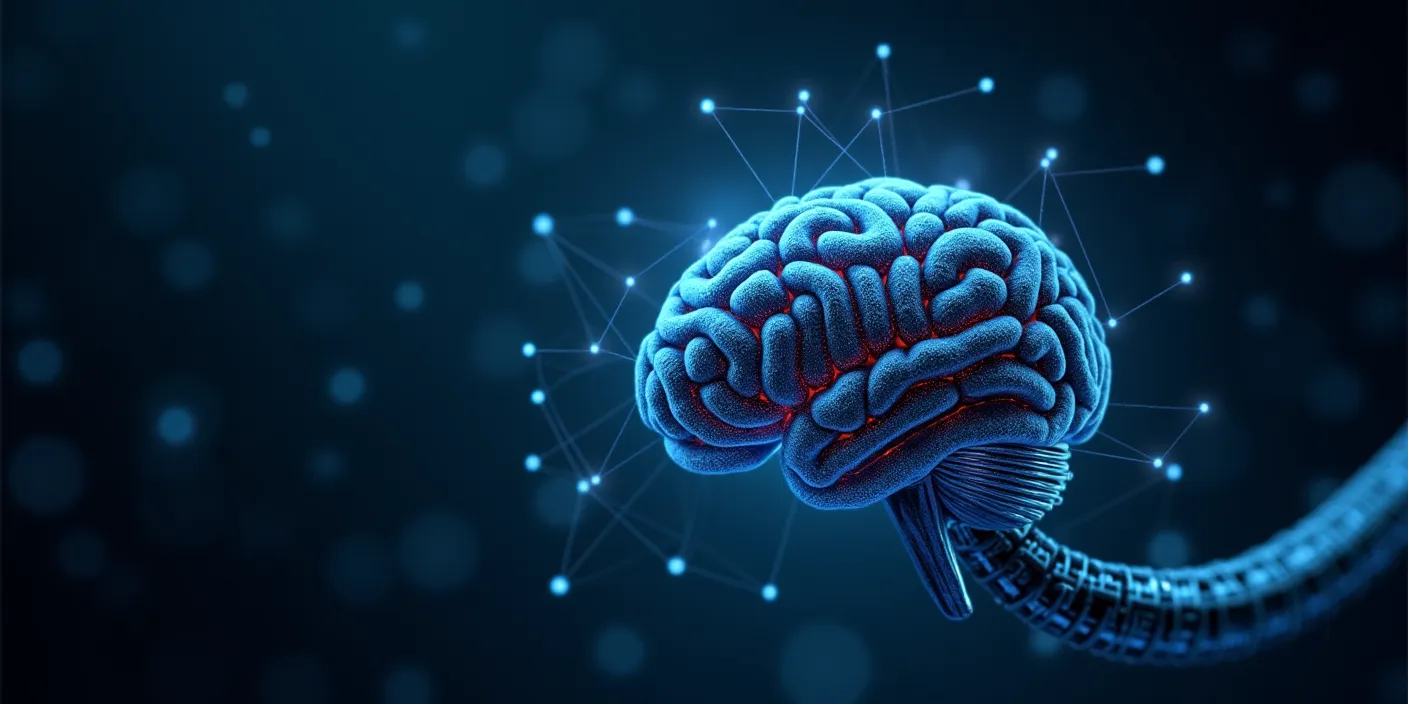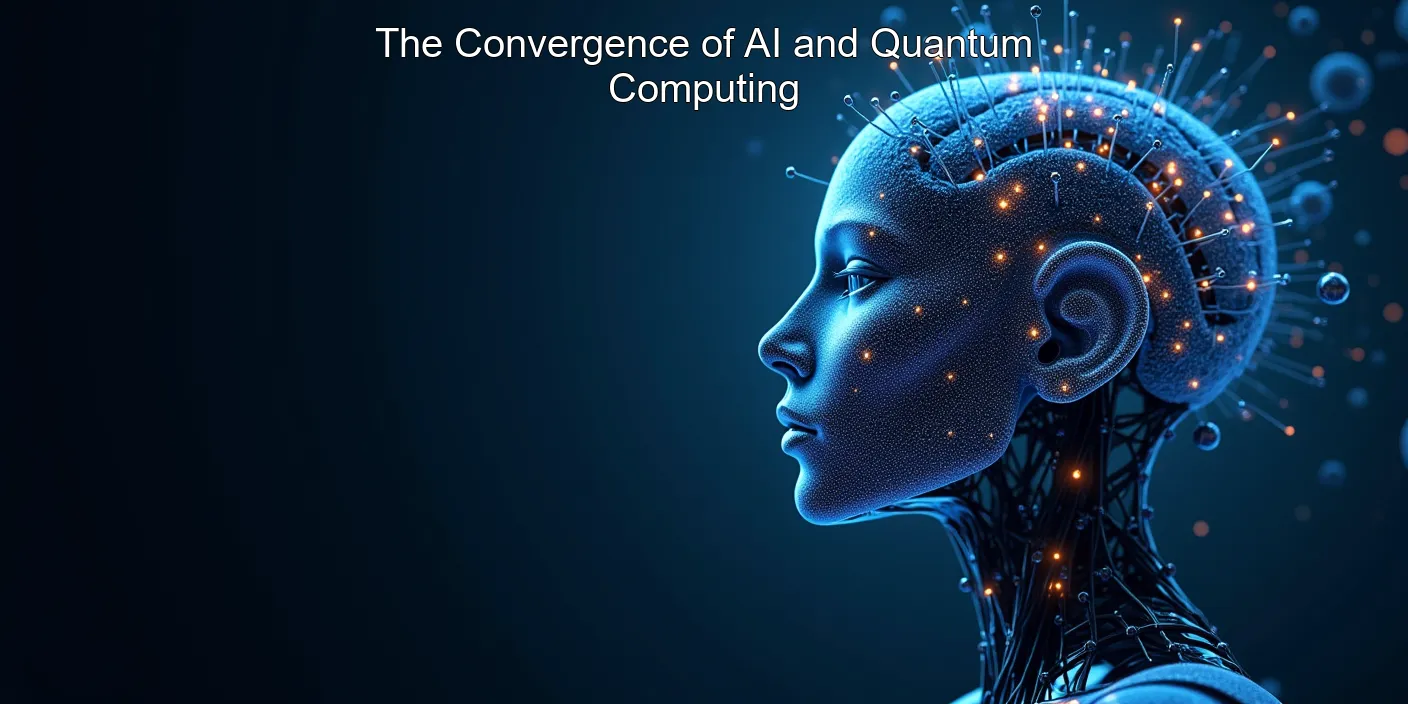AI Meets Quantum Computing: A Revolutionary Convergence
| Key Aspect | Impact |
|---|---|
| Processing Power | Exponential increase |
| Problem Solving | Complex optimization |
| Data Analysis | Enhanced pattern recognition |
The convergence of artificial intelligence and quantum computing is poised to revolutionize technology. Here’s what you need to know:

“AI Meets Quantum: Revolutionizing Technology”
#QuantumComputing, #AI, #TechFuture
- Quantum AI combines the power of quantum mechanics with machine learning
- It promises to solve complex problems beyond classical computing capabilities
- Applications span from drug discovery to financial modeling
- Major tech companies are investing heavily in quantum AI research
“Quantum computing and AI will transform industries in ways we can’t yet imagine.” – Sundar Pichai, CEO of Google
FAQ: Quantum AI Explained
Q: What is quantum computing?
A: Quantum computing uses quantum mechanics principles to process information, offering exponentially faster computations for certain problems.
“Quantum Computing: Harnessing Quantum Mechanics for Exponential Speed”
Q: How does quantum AI differ from classical AI?
A: Quantum AI leverages quantum algorithms to enhance machine learning, potentially solving complex problems more efficiently than classical AI.
Q: When will quantum AI be commercially available?
A: While still in early stages, experts predict practical quantum AI applications within 5-10 years.
5 Key Benefits of Quantum AI
- Accelerated drug discovery and development
- Enhanced cybersecurity through quantum encryption
- Optimized supply chain and logistics management
- Advanced climate modeling and prediction
- Revolutionized financial risk assessment
According to a recent study by Boston Consulting Group, quantum computing could create up to $850 billion in annual value by 2050.
Challenges and Ethical Considerations

| Challenge | Potential Solution |
|---|---|
| Technical Complexity | Continued research and development |
| Ethical Concerns | Robust governance frameworks |
| Workforce Impact | Reskilling and education programs |
While the potential of quantum AI is immense, it’s not without challenges:
- Technical hurdles in maintaining quantum states
- High costs associated with quantum hardware
- Potential for misuse in cryptography breaking
- Need for new algorithms and software paradigms
“With great power comes great responsibility. We must ensure quantum AI benefits humanity as a whole.” – Dario Gil, Director of IBM Research
FAQ: Addressing Quantum AI Concerns
Q: Is quantum AI a threat to current encryption methods?
A: While it poses challenges, researchers are developing quantum-resistant encryption algorithms.
Q: How can we ensure ethical use of quantum AI?
A: Implementing strong governance, transparency, and international cooperation is crucial.
Q: What skills will be needed in the quantum AI era?
A: Expertise in quantum physics, advanced mathematics, and AI algorithms will be highly valued.
Steps to Prepare for the Quantum AI Future
- Invest in quantum computing and AI education
- Collaborate with research institutions and tech companies
- Develop quantum-safe security protocols
- Explore potential applications in your industry
- Stay informed about regulatory developments
A survey by Deloitte found that 41% of executives expect quantum computing to have a significant impact on their industries within the next five years.
As we venture into this new frontier, it’s crucial to balance innovation with responsibility. The convergence of AI and quantum computing opens up exciting possibilities in AI Innovations, but also raises important questions about Ethical AI. From revolutionizing AI in Entertainment to transforming AI in Everyday Life, quantum AI promises to reshape our world in profound ways.
The Convergence of AI and Quantum Computing

| Key Points | Impact |
|---|---|
| Exponential processing power | Faster problem-solving |
| Enhanced machine learning | More accurate predictions |
| Quantum-inspired algorithms | Novel AI applications |
The fusion of artificial intelligence and quantum computing is ushering in a new era of technological advancement. This powerful combination promises to revolutionize various fields, from drug discovery to financial modeling. Let’s explore the key aspects of this groundbreaking convergence:
“AI & Quantum Computing: Revolutionizing Drug Discovery & Finance”
- Quantum-enhanced machine learning algorithms
- Quantum neural networks
- Quantum-inspired optimization techniques
- Quantum-safe cryptography for AI systems
“Quantum computing and AI together have the potential to solve some of the world’s most complex problems in ways we can’t even imagine yet.” – Dario Gil, Director of IBM Research
FAQ: AI and Quantum Computing
Q: How does quantum computing enhance AI capabilities?
A: Quantum computing provides exponential processing power, allowing AI algorithms to handle complex calculations and data analysis much faster than traditional computers.
Q: What are some potential applications of AI and quantum computing?
A: Applications include drug discovery, financial modeling, climate change prediction, and optimization of supply chains and logistics.
Q: When will we see practical implementations of AI and quantum computing?
A: While still in early stages, experts predict significant practical applications within the next 5-10 years as quantum hardware and AI algorithms continue to advance.
Steps to Prepare for the AI-Quantum Era
- Stay informed about advancements in both AI and quantum computing
- Invest in quantum-ready infrastructure and software
- Develop skills in quantum programming and quantum machine learning
- Explore potential use cases within your industry
- Collaborate with research institutions and tech companies
According to a recent study by McKinsey, the potential economic impact of quantum computing could reach $700 billion annually by 2035, with AI applications being a significant driver of this value.
Ethical Considerations in AI-Quantum Integration
| Ethical Concern | Potential Solution |
|---|---|
| Data privacy | Quantum-safe encryption |
| Algorithmic bias | Diverse development teams |
| Job displacement | Reskilling programs |
As we venture into this new technological frontier, it’s crucial to address the ethical implications of combining AI with quantum computing. You’ll need to consider the following aspects:
- Ensuring data privacy and security in quantum-enabled AI systems
- Mitigating potential biases in quantum-enhanced machine learning algorithms
- Addressing the societal impact of advanced AI-quantum technologies
- Developing ethical guidelines for research and application
“With great power comes great responsibility. As we unlock the potential of AI and quantum computing, we must ensure that we use these technologies for the benefit of humanity.” – Sundar Pichai, CEO of Google and Alphabet
FAQ: Ethical AI-Quantum Computing
Q: How can we ensure the responsible development of AI-quantum technologies?
A: By implementing strict ethical guidelines, fostering interdisciplinary collaboration, and maintaining transparency in research and applications.
Q: What are the potential risks of AI-quantum integration?
A: Risks include increased cybersecurity threats, exacerbation of existing AI biases, and potential misuse of powerful predictive capabilities.
Q: How can we prepare for the societal impact of AI-quantum advancements?
A: By investing in education and reskilling programs, promoting public awareness, and developing adaptive policies and regulations.
Best Practices for Ethical AI-Quantum Development
- Establish diverse and inclusive research teams
- Implement rigorous testing and validation processes
- Prioritize explainability and transparency in AI-quantum systems
- Engage in ongoing dialogue with ethicists, policymakers, and the public
- Develop industry-wide standards for responsible AI-quantum integration
A survey by the World Economic Forum found that 85% of business leaders believe that quantum computing will have a significant impact on their industry within the next decade, highlighting the need for proactive ethical considerations.
As we embrace the potential of AI Innovations and quantum computing, it’s essential to balance technological progress with ethical responsibility. By addressing these concerns head-on, we can harness the power of this new era of technology while ensuring it benefits all of humanity. The future of AI in Everyday Life will undoubtedly be shaped by quantum advancements, but it’s up to us to guide its development in a responsible and equitable manner.
The convergence of AI and quantum computing not only promises groundbreaking advancements in technology but also opens up new avenues for AI in Entertainment. From creating immersive virtual realities to generating complex storylines, the possibilities are endless. However, as we explore these exciting frontiers, we must remain vigilant about Ethical AI practices to ensure that our technological progress aligns with our values and benefits society as a whole.
| Key Points | Impact |
|---|---|
| Synergy between AI and quantum computing | Exponential increase in processing power |
| Quantum algorithms for machine learning | Faster and more efficient AI models |
| Potential for solving complex problems | Breakthroughs in various scientific fields |
The fusion of artificial intelligence and quantum computing is ushering in a new era of technological advancement. This powerful combination promises to revolutionize various industries and solve previously intractable problems. Let’s explore the key aspects of this exciting convergence:
- Enhanced computational power for AI algorithms
- Quantum-inspired machine learning techniques
- Optimization of complex systems and processes
- Advancements in cryptography and data security
“Quantum computing and AI together have the potential to solve some of the world’s most pressing challenges, from climate change to drug discovery.” – Dario Gil, Director of IBM Research
Q: How does quantum computing enhance AI capabilities?
A: Quantum computing provides exponentially faster processing for complex AI algorithms, enabling more sophisticated models and quicker problem-solving.
Q: What industries will benefit most from this convergence?
A: Healthcare, finance, cybersecurity, and scientific research are expected to see significant advancements due to AI and quantum computing synergy.
Q: When will we see practical applications of quantum AI?
A: While still in early stages, experts predict practical quantum AI applications could emerge within the next 5-10 years.
5 Key Benefits of AI and Quantum Computing Integration
- Accelerated drug discovery and development
- Enhanced financial modeling and risk assessment
- Improved climate change predictions and mitigation strategies
- Advanced materials science and nanotechnology research
- Revolutionized cryptography and data security measures
According to a recent study by McKinsey, the potential economic impact of quantum computing could reach $700 billion annually by 2035, with AI applications being a significant driver of this value.
Ethical Considerations and Future Challenges

| Ethical Concerns | Potential Solutions |
|---|---|
| Data privacy and security | Quantum-resistant encryption |
| Algorithmic bias | Diverse development teams and rigorous testing |
| Workforce displacement | Reskilling programs and new job creation |
As we venture into this new technological frontier, it’s crucial to address the ethical implications and challenges that arise. Ethical AI considerations become even more critical when combined with the power of quantum computing.
- Ensuring responsible development and deployment of quantum AI systems
- Addressing potential socioeconomic impacts
- Establishing global governance frameworks for quantum AI technologies
- Promoting transparency and explainability in quantum AI decision-making
“With great power comes great responsibility. As we advance quantum AI, we must prioritize ethical considerations to ensure its benefits are equitably distributed.” – Fei-Fei Li, Co-Director of Stanford’s Human-Centered AI Institute
FAQ: Ethical Quantum AI
Q: How can we ensure quantum AI is developed ethically?
A: By implementing robust governance frameworks, diverse development teams, and continuous ethical assessments throughout the development process.
Q: What are the potential risks of quantum AI?
A: Risks include increased cybersecurity threats, exacerbation of existing biases, and potential misuse in warfare or surveillance.
Q: How can we prepare for the societal impact of quantum AI?
A: Through education, public engagement, and proactive policy-making to address potential job displacement and skill gaps.
5 Steps to Ensure Responsible Quantum AI Development
- Establish international collaboration and standards
- Invest in quantum AI ethics research and education
- Implement rigorous testing and validation protocols
- Develop quantum-resistant cybersecurity measures
- Create inclusive stakeholder engagement processes
A survey by the World Economic Forum found that 85% of business leaders believe quantum computing will have a significant impact on their industries within the next decade, highlighting the urgency of addressing these ethical considerations.
As we embrace the potential of AI Innovations and quantum computing, it’s essential to balance technological progress with ethical considerations. By doing so, we can harness the full potential of this new era of technology while ensuring its benefits are realized responsibly and equitably across society.

The convergence of AI and quantum computing is not just transforming technology; it’s reshaping our understanding of what’s possible in AI in Everyday Life. From revolutionizing scientific research to enhancing AI in Entertainment, the possibilities are truly mind-boggling. As we stand on the brink of this new technological frontier, one thing is clear: the future of AI and quantum computing is limited only by our imagination and our commitment to ethical innovation.



